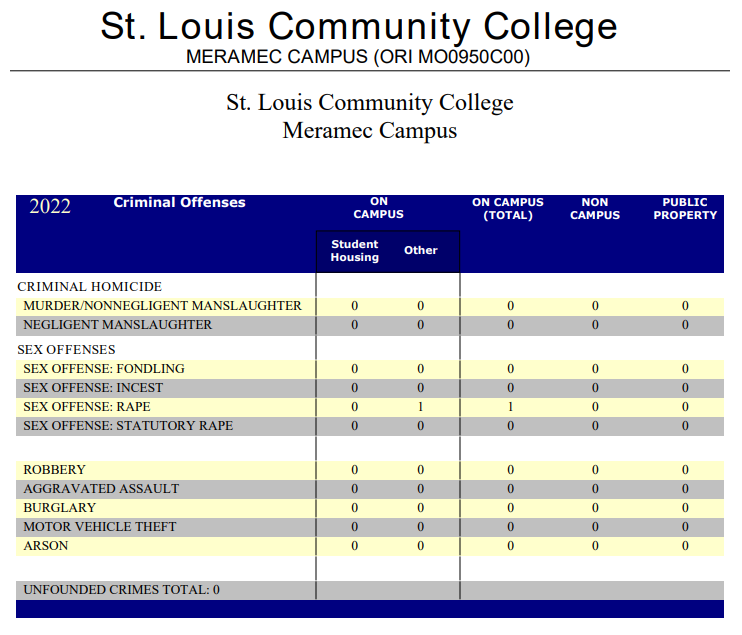Alumnus reflects on the times

Kurt Oberreither
-News Editor-
An alumnus from then Meramec Community College (MCC), Charles Stith, was appointed as the ambassador of the United States to Tanzania by President Bill Clinton. He is also the founder and former president of the Organization for a New Equality (O.N.E.).
During his time at MCC, Stith wrote a number of columns for “The Montage” in 1970, a time of civil unrest in America and war overseas. His first commentary was titled “The Black Point of View.”
“During those columns, [it] was not only a way of expressing myself personally rather than to [reflect] on the times, but it was also a way of giving expression to some of the issues we were struggling with as black students,” Stith said.
“… there was thunder and then a light. And then came a voice from the winderness saying unto me, Dig, I want you to write and tell the folks about some really relevant stuff (‘cause “relevancy” is the thing nowadays).”
Thursday, September 24, the A.B.C. (Association of Black Collegians) presented poignant viewpoints on two very “relevant” controversial subjects: racism and the oppressive conditions exiting in this country, and the war in Viet Nam. The form of this presentation: two films, Interview With Bobby Seale and People’s War.
During the interview, Bobby Seale revealed some of the abuses he encountered during his incarceration. “To try and break my spirit, they (the guards) choked me and beat me, kicking me in the groin area until I passed out. When I came to, I was in a cell, hole-like in appearance. There were no windows, no furniture, but there was a hole that I was suppose to use to take care of my wants, defecation and urination. There was a flushing mechanism above the hole, but when I tried to use it, it made the contents in the hole, defacation and urination, back up. The stuff was about an inch or an inch and a half deep, covering the whole floor. I was made to exist under these types of conditions for hours.” Bobby Seale also commented on the racist and oppressive conditions existing in this country, but this is something that we’re all aware of (Sure we know!)
The second film, People’s War, conveyed some of the prevalent attitudes of the South Vietnamese people. One, that they do not look upon the United States as the Great Protector, but as the Great Destroyer. Secondly, that the United States will be defeated in her efforts to subjagate neo-colonialistically, South Vietnam. Finally, that they (the South Vietnamese) are more than prepared and willing to wage their war of resistance.
Eavesdropping: (a man (?) talking to two boys (?))”, “Looka here — fellars, ya’ll shouldn’t hate “The man (?),” just think how good he’s been to ya! (?)”
“The Black Point of View” originally printed in Volume 7, Issue 3 by: Charles Stith
“Contextually it was a very interesting time,” Stith said. “You had the war in Vietnam going on, you had the new militancy. Issues had a lot more of an edge; it was an interesting period in that respect.”
At Meramec Stith said he focused on sociology and journalism and was president of the African American student union, the Association of Black Collegians (ABC), from 1970 to 1971.
“The level of conversation about issues was very thoughtful and very sophisticated,” Stith said. “Like most college campuses, the debates around the war, the debates around social justice were pretty intense, as they were all across the country.”
Martin Luther King Jr., Stokely Carmichael and other members of the Student Nonviolent Coordinating Committee were among the activists that influenced the content of his column, Stith said.
“From an intellectual perspective, it was a very stimulating time – not just as in related to movement politics and the history of people liberation struggles,” Stith said.
While with O.N.E., Stith’s efforts led to the first comprehensive community reinvestment agreement in the country: a $500 million package for communities in Massachusetts.
“The fervor and the energy of that point in history that really forced America to look at these issues of race and justice, opportunity laid the foundation for everything we’ve seen since then,” Stith said.
Stith said after two years at Meramec, it was clear he wanted to be a minister. He transferred to Baker University in Baldwin, Kan., before earning a masters of divinity degree from the Interdenominational Theological Center in Atlanta, Ga. In 1977, he earned a masters of theology from Harvard University Divinity School.
In 1995, Stith published Political Religion, a book which aims to answer whether or not politics and religion can mix. He has also contributed to publications such as the Chicago Sun Times, USA Today and the New York Times. He said his style has evolved over the years.
If he were to write from the black point of view today, Stith said it would be “a bit different” from what he wrote at Meramec, both contextually and in terms of content.
“If you asked me in 1970 – when I was a student at Meramec Community College – if I thought I’d live to see an African American elected president of the United States, my response in 1970 would have been ‘no way, no how,’” Stith said.
Currently, Stith is the Director of the African Presidential Archives and Research Center and an adjunct professor of international relations at Boston University.
Stith said over time he was able to find his voice and it is important that perceptions change too.
“For a good portion of the black experience in America, we have reflected some of America’s most significant mistakes. And the fact that we are recovering is a testament to the resilience and vibrance of our democracy,” Stith said. “But the fact that we’ve had challenges in this country that haven’t fully evolved yet, we’ve made unimaginable progress.”











